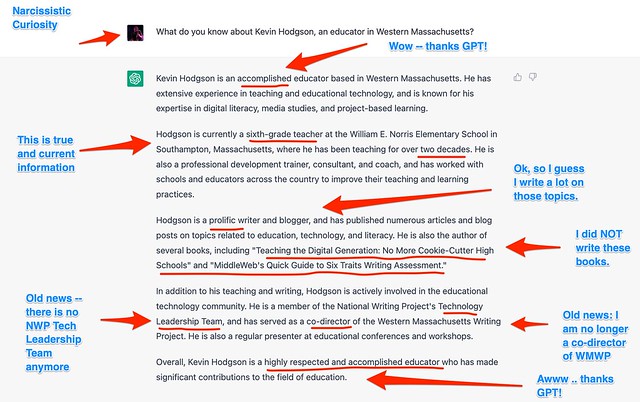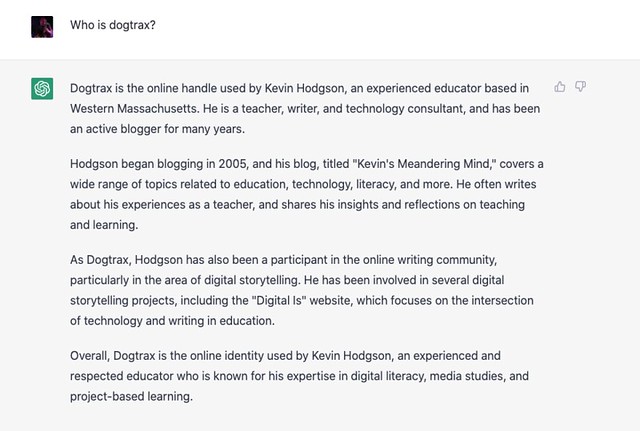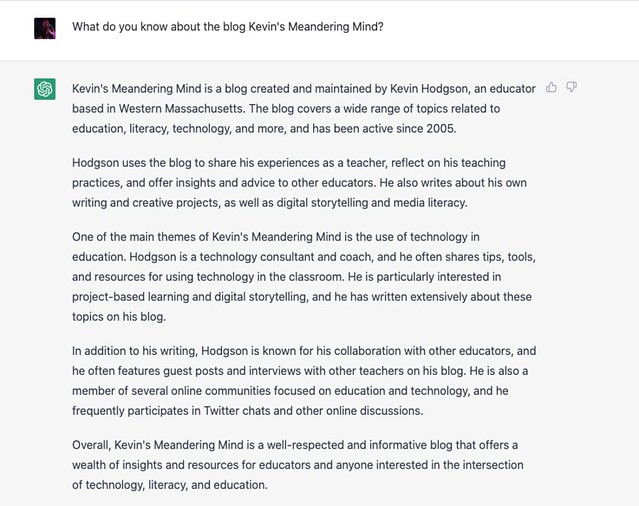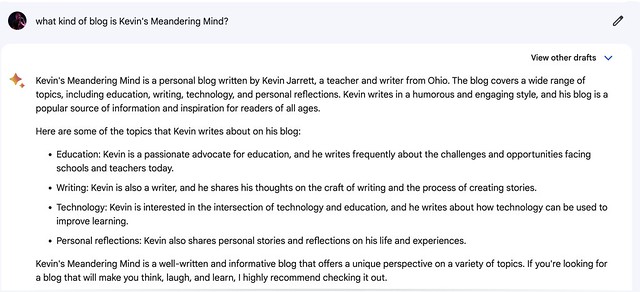Forget Googling oneself. I wondered what would happen if I ChatGPT-ed myself. What would it know about me? Sure, it’s narcissistic but I was curious about this new emerging technology.
When I Googled myself (with additional information about “teacher” and “Western Massachusetts” etc) before doing this ChatGPT experiment, I saw links to articles I have written for various publications and assorted media, some of which were me and some of where not me (some other Kevin in the world with shared name). There was no narrative about who I might be, just links that might lead me back to me, somewhere else, online.
When I ChatGPT-ed myself (OK, I need a better term here, particular when Bard and other AIs get in the mix), it actually knew quite a bit about me, and it was quite laudatory in its narrative description (it was some cheerleading to end a long week although I felt embarrassed to read some of it). But it also wrong about a few things, including the so-called books I wrote (I didn’t write those books).
Since I am not sure exactly where it has gathered its information, I assume most of it is from either articles I have written, my blog here, and other open educational spaces where I have long been active. I’ve left a lot of words in a lot of place over the years. The false reference to those books it says I authored likely came from book reviews I had done on them.
I also asked it about my Dogtrax moniker, and it knew it was me.
And I asked it about my blog, and it knew my blog and that I wrote it.
When I did similar queries into Google’s Bard Chat AI, it was not much worth of much at all.
First, Bard didn’t know who I was (OK, so maybe that’s a good thing that I am not in its database? I’m not even sure anymore).
Second, it referenced a teacher/writer with the question about “Who is Dogtrax?”, although not my specific name (now I am thinking maybe searching by name is one of the guardrails of Bard?) but it lumped a reference to me in with someone who wrote a book of poetry (Wait — maybe that’s me, too?) as well as “a dog who runs a popular Instagram account” (which is definitely not me, but now call me curious).
Bard seemed to know my blog but said it was Kevin Jarrett (another educational writer) who wrote it. I don’t think Kevin Jarrett had a blog of the same name, and I searched to no avail, but the rest of the references seemed to be about my blog (maybe, it was sort of a generic response). It ended with this as a recommendation: “If you’re looking for a blog that will make you think, laugh, and learn, I highly recommend checking it out.”
What do we make of all of this? (I seem to be asking myself this question a lot these days)
One lesson is that if you have been writing out in the open, your words and ideas are likely in the belly of the machine. I searched for my wife’s name and nothing came up, although she, too, is a writer and educator, just not as openly published as I have been. I’ve done that knowingly, which is important to understand as a writer.
It should be a given, too, that you don’t want to search ChatGPT for information about something and think it is all true. But it can give you a snapshot — one data point — that might inform you about something.
Maybe even yourself, if you are curious enough to try.
Peace (and Search),
Kevin






I tried the same experiment last week, and got similar results. There were some really bad errors, like me getting an award in 2011 from the White House, or me being a widely sought keynote speaker.
This is a concern because while I recognize and can correct any errors or exaggerations, other people won’t know what’s correct or incorrect.
Yep. It’s not truth machine, that’s for sure